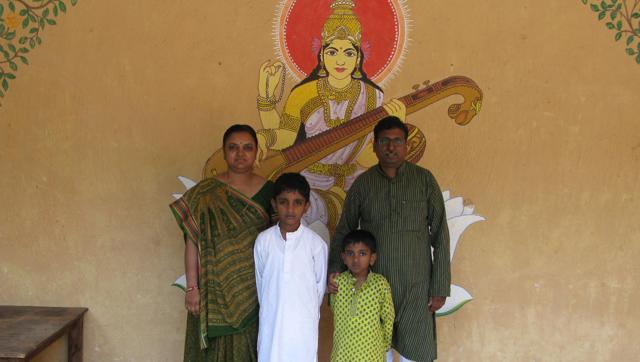
Wooden carts and horses in the front yard, mooing cows in the barn, walls with hand painted frescoes and food being cooked on a stove fired by cow dung cakes — this is not a set for a period drama, but a residential school for boys in the heart of Sabarmati in Ahmedabad.
Canada-based Nandini and Rajeev Vishwakarma wanted an education for their two sons that would equip them with life skills, without alienating them from India’s spiritual and traditional heritage.
After months of research, they flew down to Sabarmati in Gujarat with their sons, nine-year old Kuber and Shiva who is five. Their stop was the Hemchandra Sanskrit Pathshala, a Gurukulam (residential school) for boys run by a Jain trust. Most of the students here are in the age group of 6 to 18 years.
The Vishwakarmas were convinced that the Gurukulam imparted the holistic education they were looking for. And so, Kuber is now at the Gurukulam with 100 other kids. But what sets the Gurukulam apart is that the 5,000 square yard campus, nestled in a residential pocket of Sabarmati, is a trek back in time.
A unique campus
Stone floors are plastered in cow dung as it is supposed to have anti-radiation properties, walls are whitewashed with lime, food is organically produced, milk comes from the 60-odd cows in the barn; in the kitchen, cow dung cake is the cooking fuel and ash works as a detergent. Electricity is the only modern energy source, though its judicious use is underlined several times over. Education is imparted in Sanskrit, Hindi and Gujarati. No fee is charged from students. There are annual holidays and breaks, but no school leaving exams or certification from any school board.

Model school
A similar set up has been started for girls a little distance away from the Gurukulam, where 225 girls are enrolled. This too is run by a Jain sect. Gurukuls run by religious trusts have also come up in Maharashtra’s Kaneri where there are 100 students and in Rajasthan’s Jodhpur which has 50 students. “About 10-15 organisations that have land and resources approached us to set up Gurukuls; some IITs and IIMs have envisaged interest too. But right now, we cannot expand as this is not a commercial enterprise. In Sabarmati we have a student teacher ratio of 100:150. We are now focusing on orienting right Acharyas (teachers),” he says.
Even as Kanitkar holds out the Gurukul model as an answer for “undoing the frailties of western learning concepts” adopted by Indian schools, he is categorical in wanting to keep the government out. “We think sarkar and bazaar (government and businesses) should not have anything to do with imparting education,” he says.
For the RSS, implementation of teaching in the mother tongue and a push for revisiting the knowledge in the Vedas, the gurukul system also offers a shot at inculcating nationalism. Though most of the gurukuls are controlled by religious sects, nationalism, bordering on anti-west sentiments is a perspicuous presence.
Take the case of 10- year-old Manjit Singh, a student at the Gurukulam who earlier went to a school in Alwar; he says the Gurukulam is unlike the “vinashkari” (destructive) education system started by the British. “The traditional gurukul system that produced Kings like Lord Ram was destroyed by the British and if we move away from our culture we will also be destroyed,” says the aspiring musician with a reasoning that belies his age.

Astrologer Mohan Bhai Patel taking a class on astrology. (Smriti Kak Ramachandran/HT Photo )
At the Gurukulam
• Kautilya’s treatise on governance ‘Arthashastra’, Vedic Maths, music, arts and ayurvedic medicine are part of the curriculum as is astrology
• There are no cramped classrooms, groups of students are taught together based on their mental ability and proficiency. A music class, for instance, could have students from 6 to 16 learning together
• Students from the age group of 6-18 are enrolled
• For recreation there is the traditional gymnastics (Malkhamb) and horse riding
Degree of learning
The lack of certification is not a deterrent for most here; though some students opt to enroll in the National Open School system for a certificate. No students have passed out yet from the Gurukulam, but most want a career in fine arts, music; with some wanting to become monks.
“We do not discourage students from enrolling as private candidates, but a majority is happy with the learning outcome here,” says Koirala, himself a product of a gurukul.
The Gurukulam also doubles up as an ecosystem for organic practices, a throwback to what was followed centuries ago.
Jeetu Bhai Balad, a trustee, has converted a portion of the complex into a repository for ancient knowledge. On the top floor of a building are workshops for creating special paper and ink used for writing scriptures. “We are reviving ancient practices that were eco-friendly. We want to cut down on chemicals that are poisoning the environment and life,” he says.
[Source:-ht]


